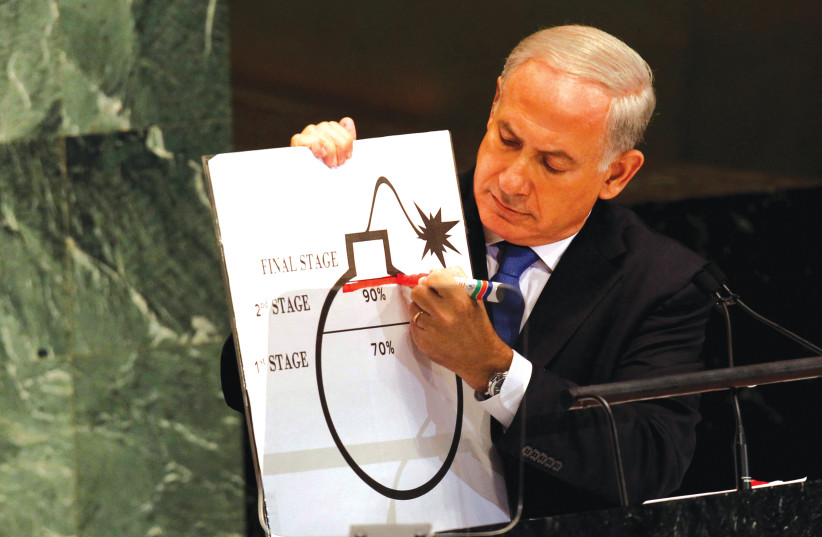The Israeli defense establishment was kept in the dark ahead of the US decision to withdraw from the Iranian nuclear deal, a move by Washington that was a “strategic mistake,” former IDF chief of staff Gadi Eisenkot said.
“Only Yossi Cohen, Ron Dermer and Benjamin Netanyahu dealt with this issue of leaving the nuclear deal. No one spoke with the security establishment,” he told Maariv.
Eisenkot said he had never attended a meeting or held one with former prime minister Benjamin Netanyahu on the possibility of withdrawing from the nuclear deal, or even about former US President Donald Trump’s peace plan with the Palestinians.
“This does not make sense,” he said. “This is not the right way to run a country.”
Describing the atmosphere prior to the decision, he said that “Netanyahu came with one worldview and narrative, the defense establishment came with another story and narrative.”
Eisenkot said he was aware that the Mossad was pushing the Americans to withdraw from the deal, while he was building his multi-year plan on the assumption that the IDF could look forward to a decade of quiet on the nuclear issue.

That assumption “allowed us for the first time to delivery enormous resources, tens of billions, in favor of other missions” including destroying cross-border tunnels belonging to both Hezbollah in the North and Hamas in the South, building the barrier along the border with the Gaza Strip and increasing technological capabilities.
“Then, in the middle of it all, comes the exit from the agreement. And we are surprised by the exit from it,” he said. “This is a matter that we did not prepare for.”
THE EXIT by the Trump administration from the Joint Comprehensive Plan of Action in 2018 was a “strategic mistake,” the former IDF chief said, adding that, while it had certain holes, the deal did slow down Iran’s nuclear program and the withdrawal “freed the Iranians from certain shackles.”
“The Iranians were in shock for a few months. They did not start enriching uranium in the first six months – only after I was no longer chief of staff, in 2019,” he said. “They had legitimacy for the violations because of the US withdrawal.”
Eisenkot believed then and continues to believe that withdrawing from the deal was done “completely out of the blue.”
Asked if Israel should attack Iran if it achieves nuclear capabilities and the missiles capable of carrying a nuclear warhead, the former IDF chief said the political echelon has set three basic principles to use force against Iran: capability, necessity and international legitimacy.
But “it’s complicated” for Israel to strike Iran on its own.
The former chief of staff also said Israel almost assassinated Iran’s Revolutionary Guards Corps Commander Qasem Soleimani a year and a half before he was killed by an American drone strike in Baghdad.
“In Operation House of Cards, Soleimani survived death,” he said, referring to a large-scale Israeli attack on Iranian targets in Syria in May 2018 after rockets were fired toward the Golan Heights.
It was described by the IDF at the time as “the most extensive operation in Syria since 1974” and saw 100 Iranian targets in Syria destroyed following a missile barrage of 32 Fajr-5 and Grad missiles toward Israel’s front defensive line in the Golan Heights.
“We decided that if he was in a command center or operations room or somewhere in the area, we would take him out – and we had approval for that,” Eisenkot said. “But we could not close the circle on him.”
ISRAEL HAS carried out thousands of strikes against Iran and Hezbollah in Syria as part of its war-between-war (known in Hebrew as MABAM) campaign that the former chief of staff said began around 2009 under the command of Gabi Ashkenazi.
It intensified under his predecessor Defense Minister Benny Gantz, and in 2017, then-prime minister Benjamin Netanyahu and then-defense minister Avigdor Liberman accepted their recommendation to allow the IDF to use “the most significant use of force” for years against Iran in Syria.
As part of MABAM, Israel has also targeted dozens of Iranian weapons convoys heading to Lebanon for Hezbollah. The Iranian-backed group poses a “very significant threat” to Israel and has an arsenal of 150,000 rockets and missiles.
While “we have very significant capabilities – both defensively and offensively,” a war that would break out on the northern border “will not be simple,” Eisenkot warned.
Some 2,000 rockets are expected to be fired toward Israel each day by the group from Lebanon, and ground infiltrations by the group’s elite Radwan forces are expected as well. Civilians living along the border are expected to be evacuated from the border.
“If in 2006 they got Dahiya, next time it will be double Dahiya,” he threatened, referring to the strategy he outlined that endorses the disproportionate use of power and sees the destruction of civilian infrastructure in order to deny Hezbollah from using it.
As part of MABAM, the IDF also participated in the war against ISIS. It also carried out numerous operations against the terrorist group and has been cooperating with the militaries of many countries, he said.
During a conference held by the US-led Global Coalition to Defeat Daesh (ISIS), Eisenkot said that he was visited “quietly by generals and chiefs of staff from countries that had never met with Israelis, as well as those who later signed with the Abraham Accords.
“Israel is waging war throughout the Middle East, and we are cooperating with many armies on countless special operations, and the damage caused to ISIS is very extensive,” Eisenkot said. He estimated “hundreds of Daesh operatives were killed and over 1,000 wounded; facilities and infrastructure were destroyed.”
